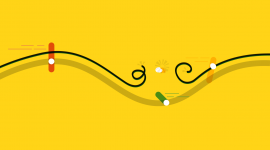Trong mùa dịch COVID-19, nhằm phục vụ cho mục đích học tại nhà một cách hiệu quả thì việc học từ mới là một phần không thể thiếu trong quá trình học tiếng Anh. Để giúp các bạn có thêm nhiều từ vựng phong phú hơn đặc biệt trong chủ đề environment (môi trường), list từ vựng dưới đây là list từ đã được tổng hợp từ nhiều nguồn uy tín nhằm giúp các bạn đam mê với tiếng Anh sẽ có thêm lượng vocab để dùng trong phòng thi IELTS SPEAKING. Dưới đây là 43 từ vựng được dùng nhiều nhất và phổ biến nhất trong topic environment.

1. Global warming: Sự nóng lên toàn cầu = the increase in temperature of the earth’s atmosphere that is caused by the increase of particular gases, especially carbon dioxide
2. Pollution: sự ô nhiễm/quá trình ô nhiễm = the process of making air, water, soil, etc. dirty; the state of being dirty
- Environmentalists say there is a high risk of pollution from the landfill site.
- Many athletes feel the effects of air pollution during outdoor exercise.
- The computer model assesses the likely impact of new pollution sources.
- The summit ended with a joint pledge to limit pollution.
3. Pollutant: chất gây ô nhiễm = a substance that pollutes something, especially air and water
4. Greenhouse gas emissions: khí thải nhà kính
- Both are common pollutants and suspected carcinogens.
- pollutants from nearby industries
- a washable filter to reduce air pollutants
- pollutants in exhaust gases
5. The ozone layer: tầng ozon = a layer of ozone high above the earth’s surface that helps to protect the earth from harmful radiation from the sun
- A hole in the ozone layer was discovered over Antarctica.
- The ozone layer protects life on earth by absorbing harmful ultraviolet radiation.
6. Greenhouse: hiệu ứng nhà kính = a building with glass sides and a glass roof for growing plants in
7. The polar ice cap: băng vùng cực = a layer of ice permanently covering parts of the earth, especially around the North and South Poles
8. Alternatives: giải pháp thay thế = a thing that you can choose to do or have out of two or more possibilities
- The car is too expensive so we're trying to find a cheaper alternative.
- There is a vegetarian alternative on the menu every day.
9. Ecosystem: hệ sinh thái = all the plants and living creatures in a particular area considered in relation to their physical environment
- Islands often support delicate ecosystems that evolved without any need for defence.
10. Wildlife: các loài hoang dã = animals, birds, insects, etc. that are wild and live in a natural environment
- The increasing use of pesticides threatens the wildlife of the area.
- The large variety of native plants attracts wildlife to the area.
11. Instinct: bản năng = a natural quality that makes people and animals tend to behave in a particular way using the knowledge and abilities that they were born with rather than thought or training
- She did not seem to have any of the usual maternal instincts.
- Children do not know by instinct the difference between right and wrong.
12. Extinct = Die out: tuyệt chủng = (of a type of plant, animal, etc.) no longer in existence
- The red squirrel is in danger of becoming extinct in England.
- The numbers of these animals have been falling steadily and they are now almost extinct.
13. Environmentalist: nhà môi trường học = a person who is interested in the natural environment and wants to improve and protect it
14. Natural disaster: Các thảm họa thiên nhiên = a sudden and violent event in nature (such as an earthquake, hurricane or flood) that kills or injures a lot of people or causes a lot of damage
- Emergency treatment of drinking water may be necessary following natural disasters.
- This is an unprecedented natural disaster.
15. Shortage/ the lack of: sự thiếu hụt = a situation when there is not enough of the people or things that are needed
- There is no shortage of (= there are plenty of) things to do in the town.
16. Vegetation: thực vật = plants in general, especially the plants that are found in a particular area or environment
- The hills are covered in lush green vegetation.
- As we drove towards the desert, the vegetation became sparse.
- Removal of the natural vegetation has resulted in a loss of nutrients in the soil.
- piles of rotting vegetation
17. Man-made: do con người gây ra = made by people; not natural
18. Deforestation: phá rừng = the act of cutting down or burning the trees in an area
- land erosion caused by widespread deforestation
19. Exploit: khai thác = to use something well in order to gain as much from it as possible
- She fully exploits the humour of her role in the play.
- The company has been successful in exploiting new technology to the full.
20. Culprit: thủ phạm = a person or thing responsible for causing a problem
- The main culprit in the current crisis seems to be modern farming techniques.
- Keep the kitchen clear of all sources of bacteria, not forgetting the biggest culprit of all—the dishcloth.
21. Fossil fuels: Nhiên liệu hóa thạch = fuel such as coal or oil, that was formed over millions of years from the parts of dead animals or plants
- Carbon dioxide is produced in huge amounts when fossil fuels are burned.
- Fossil fuel reserves are rapidly being depleted.
- Gas is the only fossil fuel without environmental problems.
22. Conserve: Bảo tồn = to protect something and prevent it from being changed or destroyed
- Help to conserve energy by insulating your home.
- Renewable energy resources can help conserve fossil fuels and reduce carbon emissions.
21. Marine life: Đời sống dưới nước = connected with the sea and the creatures and plants that live there
22. Deforest: chặt phá rừng = to cut down and destroy all the trees in a place
- Two thirds of the region has been deforested in the past decade.
23. Limit/Curb: hạn chế, ngăn chặn = to control or limit something, especially something bad
- This legislation will drastically curb the power of local authorities.
- New measures should curb the speed of cars travelling through the village.
- She has to curb her natural exuberance.
24. Take advantage of/Utilize: Tận dụng = to use something, especially for a practical purpose
- The Romans were the first to utilize concrete as a building material.
- The resources at our disposal could have been better utilized.
- Vitamin C helps the body utilize the iron present in your body.
- She took advantage of the children's absence to tidy their rooms.
- We took full advantage of the hotel facilities.
- I took complete advantage of the situation.
Chúc các bạn học tập vui vẻ trong mùa dịch COVID-19!!!
NGUỒN: Oxford Advanced's Learner Dictionay (Examples)








